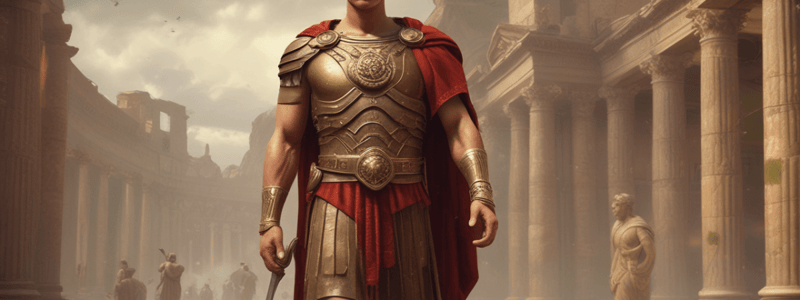Podcast
Questions and Answers
What was the primary job of the cohortes?
What was the primary job of the cohortes?
- To oversee the construction of infrastructure
- To manage the Roman economy
- To promote and maintain peace, law, and order (correct)
- To serve as advisors to Augustus
Why did Augustus divide the lands into administrative regions?
Why did Augustus divide the lands into administrative regions?
- To reward his loyal followers
- To reduce the influence of the Senate
- To simplify governance and establish a hierarchy (correct)
- To increase his personal power
What was the result of Augustus' reforms on the Senate?
What was the result of Augustus' reforms on the Senate?
- The Senate was abolished
- The Senate's power was reduced
- The number of Senators increased significantly
- The number of Senators was reduced and the Senate was restored to its former dignity (correct)
Why did Augustus introduce Moral Reforms?
Why did Augustus introduce Moral Reforms?
What was the impact of Augustus' policies on women?
What was the impact of Augustus' policies on women?
What was the outcome of Augustus' slave reforms?
What was the outcome of Augustus' slave reforms?
What period in Roman history is credited to Augustus?
What period in Roman history is credited to Augustus?
What was Augustus' attitude towards those who opposed him?
What was Augustus' attitude towards those who opposed him?
What did Augustus do to address poverty in Rome?
What did Augustus do to address poverty in Rome?
What was the impact of Augustus' policies on the equestrian class?
What was the impact of Augustus' policies on the equestrian class?
Flashcards are hidden until you start studying
Study Notes
The First Roman Emperor
- Augustus was the first Roman Emperor, named after his great-uncle Julius Caesar.
- He ruled the Roman Empire from 31 BCE until his death in 14 CE, bringing stability and peace to the people of Rome.
The Roman Republic in the 1st Century BCE
- The Roman Republic was in turmoil, with civil wars taking a toll on the population.
- Rome had two social classes: the patrician (wealthy noblemen) and the plebians (common people).
- The gap between the classes continued to widen, and tensions were high.
Julius Caesar and the Fall of the Republic
- Julius Caesar was a famous Roman general and politician who conquered Gaul and brought wealth and prestige to Rome.
- Caesar implemented social and economic reforms that benefited the common people of Rome.
- Caesar was assassinated by Senators, including Brutus and Cassius, who feared his growing power.
The Size and Scope of the Roman Empire
- The 1st Century BCE saw the end of the Roman Republic and the birth of the Roman Empire.
- Military campaigns resulted in Rome acquiring nearly all of Gaul and the entire Mediterranean.
Augustus the Roman Emperor: Biography
- Augustus was born Gaius Octavius Thurinus on September 23, 63 BCE, in a small town outside of Rome.
- He was the great-nephew and adopted son of Julius Caesar.
- Augustus claimed lineage from Aeneas, a Trojan hero, and the goddess Venus.
The Rise of Augustus
- After Caesar's death, Octavian created an alliance with Marc Antony and Lepidus, known as the Second Triumvirate.
- Octavian defeated Marc Antony in 31 BCE and became the sole ruler of Rome.
- In 27 BCE, the Senate gave Octavian the title of Princeps Civitatis and the sacred name of Augustus.
The Early Reign of Augustus
- Augustus focused on stabilizing the city of Rome, disarming fears, and charming the people.
- He implemented reforms that benefited the common people and created an infrastructure for an empire.
The Later Reign of Augustus
- Augustus expanded the Roman Empire, establishing the Pax Romana, a period of peace and prosperity from 27 BCE to 180 CE.
- He died on August 19, 14 CE, at the age of 75, after nearly 40 years of rule.
What Did Augustus Do?
- Augustus transformed the broken government of the Republic into the Roman Empire through restoration, reform, and reorganization.
- He improved transportation networks, built temples and public buildings, and established a fair taxation system.
- Augustus established two groups: the Vigiles Urbani (firemen) and Cohortes Urbanae (police) to ensure public safety and goodwill.
Social Classes in the Roman Empire Under Augustus
- Augustus introduced laws to protect and encourage marriage and family.
- He implemented Moral Reforms to outline appropriate Roman behavior.
- Augustus provided women with land ownership and inheritance rights, and unprecedented equality.
- He reorganized the lowest social class of slaves, allowing those who demonstrated good Roman behavior to be freed and granted Roman citizenship.
Studying That Suits You
Use AI to generate personalized quizzes and flashcards to suit your learning preferences.




